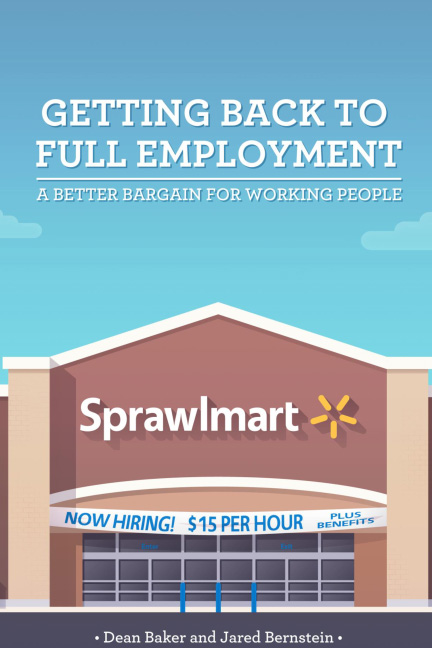
Article Artículo
Center for American Progress/Center for Economic Policy and Research Joint Comments on Proposed Revisions to TANF Financial Data CollectionShawn Fremstad / November 14, 2013
Article Artículo
Obamacare Is Not in Nearly as Much Trouble As Ezra Klein ThinksDean Baker / November 14, 2013
Article Artículo
Beyond the Conventional Wisdom on Poverty, with Two CaveatsShawn Fremstad / November 13, 2013
Article Artículo
German Economists Exist to Make Economists Elsewhere Look GoodDean Baker / November 13, 2013
Article Artículo
Latin America and the Caribbean
Entrando numa bolha: O dólar de Mercado Negro na VenezuelaMark Weisbrot / November 13, 2013
Article Artículo
Latin America and the Caribbean
Creyéndose la idea de una burbuja: El dólar del mercado negro en VenezuelaMark Weisbrot / November 13, 2013
Article Artículo
Latin America and the Caribbean
Buying into a Bubble: The Black Market Dollar in VenezuelaMark Weisbrot / November 13, 2013
Article Artículo
People Opposed Summers Because He Helped Give Us an Over-Valued Dollar and Massive Trade DeficitDean Baker / November 13, 2013
Article Artículo
The Trans-Pacific Partnership Is Designed to Increase Some BarriersDean Baker / November 13, 2013

book Libro
Getting Back to Full Employment: A Better Bargain for Working PeopleDean Baker / November 13, 2013
Article Artículo
Wall Street User Fee Could Relieve 1/3 of Sequester CutsAs the House-Senate conference committee prepares to meet to negotiate the 2014 budget on Wednesday, avoiding $109 billion in crude sequestration spending cuts seem to be a top priority.
CEPR and / November 12, 2013
Article Artículo
Does the NYT Have to Provide Op-Ed Space For People to Lie About Obamacare?Dean Baker / November 11, 2013
Article Artículo
You Can Keep Your Insurance and the Washington Post Fact Checker: Round IIDean Baker / November 11, 2013
Article Artículo
The Obama Pledge on Keeping Your InsuranceDean Baker
Truthout, November 11, 2013
Dean Baker / November 11, 2013
Article Artículo
Want 'Free Trade'? Open the Medical and Drug Industry to CompetitionDean Baker
The Guardian Unlimited, November 11, 2013
Dean Baker / November 11, 2013
Article Artículo
Robert Rubin Wants to Redistribute More Income UpwardAlong with Alan Greenspan, Robert Rubin is the person most responsible for the country's economic downturn. He helped steer the country on a path of bubble-driven growth and massive trade deficits. The latter was the result of the IMF engineered bailout from the East Asian financial crisis. The outcome of this bailout was a rush by developing countries to accumulate dollar reserves in order never to have to be in the situation that the East Asian countries faced in dealing with the IMF. This sent the dollar soaring, making U.S. goods and services uncompetitive internationally, causing the trade deficit to explode.
The lost demand from the trade deficit was offset in the 1990s by the stock bubble. The wealth created by the bubble led to a boom in consumption. Also, the ability for hare-brained Internet start-ups to raise billions by issuing stock led to an investment boom in hare-brained Internet start-ups. The bursting of the stock bubble gave us the longest period without job growth since the Great Depression. However the economy did eventually recover on the back of the housing bubble. The collapse of that bubble has given us an even longer stretch without job growth, ruined millions of lives, and will likely cost us tens of trillions of dollars in lost output.
In addition to steering the country to disaster, unlike Alan Greenspan, Robert Rubin managed to directly profit from the calamity. He personally pocketed over $100 million from his stint as a top executive at Citigroup. Citigroup was at the center of the housing bubble and meltdown. It required hundreds of billions in below market loans from the government, along with implicit and explicit guarantees to stay afloat. Naturally we should value the economic opinions of such a person, hence the Washington Post gave him space for a column telling us how China and the United States can have a mutually beneficial relationship.
Not surprisingly much of what Rubin says is just flat out wrong. He tells readers:
"The United States criticizes Chinese interest-rate, land and other subsidies that support investment and exports, including a managed exchange rate (though that has less effect, for now, because China’s current-account surplus has declined substantially). U.S. officials also fault significant shortfalls in China’s protection of intellectual property rights, including cyber-appropriation.
"China has long expressed strong concern that U.S. fiscal deficits could lead to unduly high interest rates, a U.S. or global financial destabilization or, alternatively, serious inflation."
Dean Baker / November 10, 2013
Article Artículo
When It Comes to the Jobs Report, WaPo Prefers to Repeat What Its Friends Say Rather than Look at the DataDean Baker / November 09, 2013